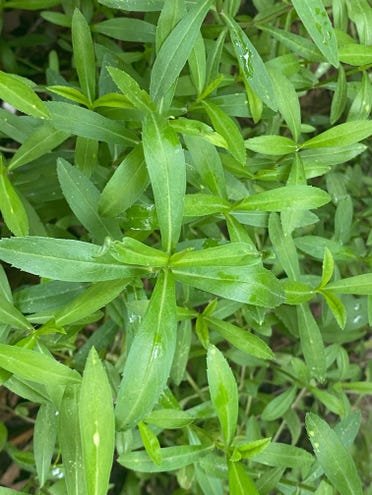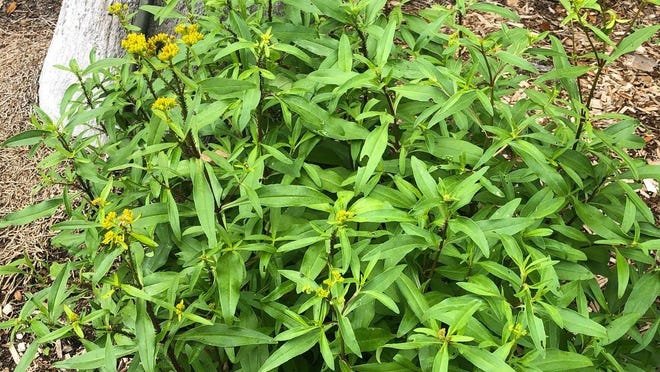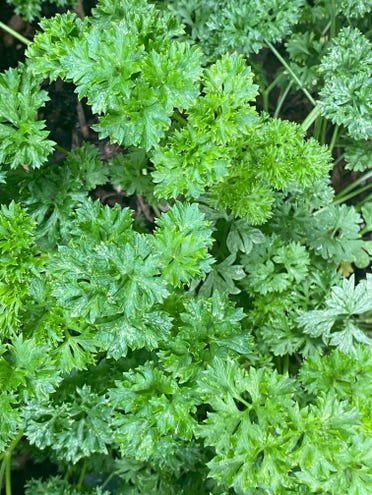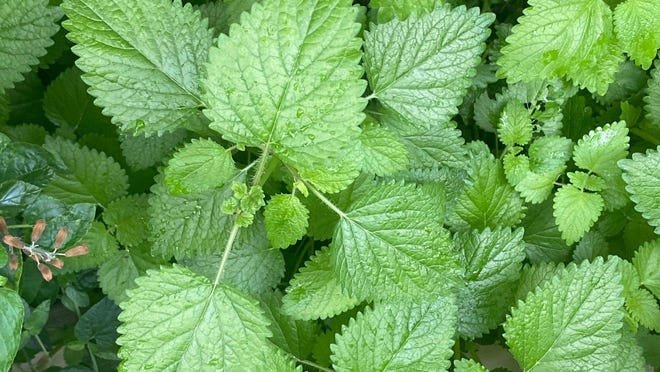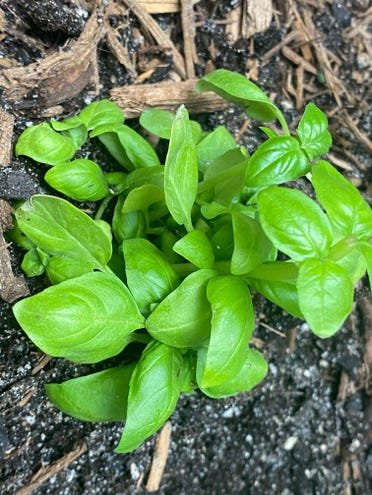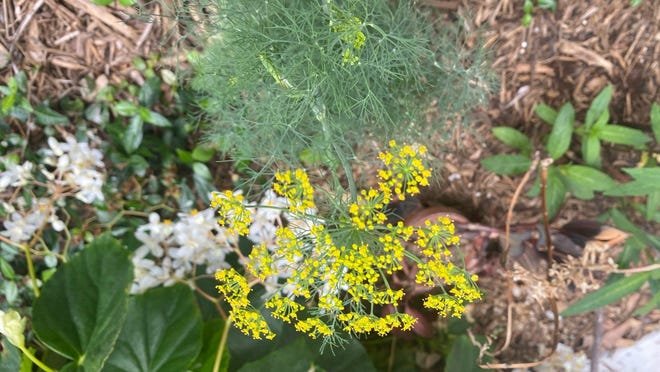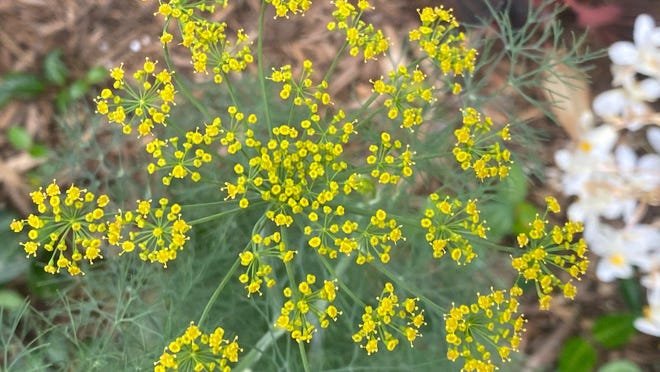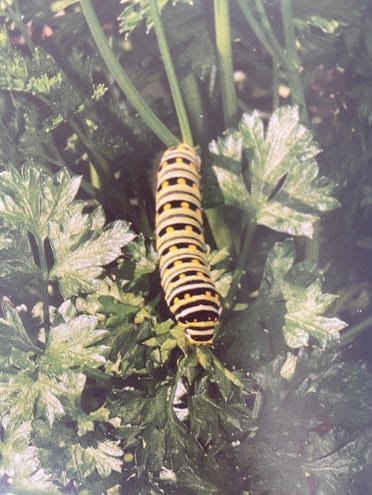Palm Beach gardens: Herbs are the perfect remedy
Dill, with its feather leaves and bright yellow flowers, will self seed easily, making it easy to grow again and again.
May 6, 2020
I realize that many are quarantined in apartments or condos with little access to gardens or landscapes. But if you have a balcony or even a sunny windowsill, you can still grow herbs. I am gardenless at the moment, but did find a small plot of ground to plant several of my favorite herbs, and the result has been wonderful.
Herbs are tough, easy, and adaptable to most soil types. I’ve planted tarragon, parsley, chives, thyme, dill, fennel, rosemary, lemon balm, mint, lavender and basil, and they are doing beautifully.
Tarragon, Artemisia dracunculus, is one of my favorites for its delightful yellow flowers and strong, licorice-like fragrance. This is a perennial in the sunflower family and an important ingredient in French cooking, as one of the four herbs in the essential “fines herbes” mixture. And you can’t make bernaise sauce without it! Additionally, it makes a wonderful low border plant along the edge of a walkway, with its dense lanceolate leaves, bushy growth habit and sparkling yellow flowers. Cut it back if it gets leggy and it will just get thicker and stronger.
Tarragon is considered one of the four essential herbs in French cuisine.
Dried tarragon leaves are an excellent addition to roasted potatoes as well as many other dishes. If you want to dry your tarragon, just cut large bunches and tie with a string or raffia and hang upside down anywhere in your kitchen away from direct sunlight. Tarragon is also added to vinegars for the anise-like fragrance.
Tarragon's dense lanceolate leaves, bushy growth habit and sparkling yellow flowers make it an ideal, dense border plant.
Dill is another favorite — easy, reliable and essential in cooking. The light airy foliage is a lovely addition to any garden setting and this also grows well in containers. Dill, Anethum gravolens, is an annual herb in the celery family. The delicate feathery leaves have a sweet, bright flavor and are a wonderful addition to soups, stews and sauces. It will self seed easily, so allow it to go to seed and you won’t need to replace it often.
The feathery leaves of the dill plant have a sweet, bright flavor and are a wonderful addition to soups, stews and sauces.
Like dill, fennel, Foeniculum vulgare, has lovely wispy foliage, and makes a wonderful addition to any perennial garden. This is a hardy perennial in the carrot family, indigenous to the Mediterranean, but now widely naturalized on dry soils near coastal areas or riverbanks. Fennel seeds contain calcium, manganese, potassium and magnesium, all important nutrients aiding in bone development, heart and immune health, also containing anti-cancer and anti-bacterial properties.
The fennel bulb is a great source of vitamin C, a potent antioxidant critical in immune health and tissue repair. Fennel has a fresh, aromatic anise flavor, and every part of the plant is edible. It can be eaten raw, sautéed, roasted or added to soups and sauces. It is one of the most versatile plants for your garden and can simply be grown as a beautiful ornamental, although you should definitely also enjoy its culinary benefits.
Parsley, Petroselinum crispum, is a well known culinary herb that can also double as a decorative landscape plant. The bright green foliage is lovely along a garden walkway, and the small white flowers attract ladybugs and other beneficial insects to your garden. This plant is the larval host for the beautiful black swallowtail butterfly — along with dill and fennel, other members of the same family. Parsley flowers are produced in attractive umbels; but usually the leaves are harvested before the plants produce flowers. In our area, black swallowtails lay their eggs on the leaves in winter and spring, so plant enough to share with them.
More than just an unused garnish on the plate, parsley is a crucial ingredient in many dishes.
Like humans, the caterpillar of the black swallowtail loves parsley!
Lemon balm, Melissa officinalis, is a perennial herbaceous member of the mint family with sharply lemon-scented foliage. It is valued for its culinary and medicinal properties and can also act as a mosquito repellent. The broad, medium textured leaves provide lovely clumps of foliage in any garden setting and the lemony fragrance of the foliage, when rubbed between your fingers, is wonderfully refreshing. The culinary values of this plant date back 2,000 years, and lemon balm tea is used to calm nerves and lift the spirit — just what we need during weeks in quarantine!
Lemon balm is valued for its culinary and medicinal properties and can also act as a mosquito repellent.
Rosemary, Rosmarinus officinalis, is a wonderfully aromatic evergreen member of the mint family that is easily grown in South Florida gardens. I have used it as a low hedge along walkways and garden borders and it never fails to please as you simply run your hands through the foliage for the amazing fragrance. The needle like leaves have a white band on the underside, giving them a lovely grayish coloration; these are soft to the touch and dry easily for use in cooking. The blue flowers are a beautiful bonus to this already distinctive and stunning plant. This is easily grown from cuttings but requires full sun and well-drained soil for optimal growth. Plants left alone can grow 4 to 5 feet, but can also be pruned to any desired height.
Basil, Ocimum basilicum, is another easy to grow annual that will triple in size in a very short time, providing you with plenty of leaves for pesto if you keep removing the flower heads. I have often bought near dead plants from Publix that I’ve felt sorry for, replanted them in a sunny spot in the garden, and after a good watering had them burst into magnificent specimens that provide fresh leaves for salads and pesto all season. There are numerous cultivars now from which to choose, including purple and dark opal, which have glorious deep violet foliage. This is a must for any garden, tucked away in a sunny spot so you can harvest its foliage at will. It’s also easy to grow in a container.
An easy-to-grow annual that will triple in size in a very short time, basil can be used in salads and pestos all year-round.
Finally, thyme, Thymus vulgaris, is one of my favorite herbs, making a lovely ground cover or filler in that stubborn spot at the edge of a patio or walkway where nothing else will grow. Not at all particular to soil, this is a tough, drought-tolerant, and delightfully aromatic herb that comes in over 50 varieties with different flavors and fragrances. Its lovely white flowers are also excellent in attracting pollinators.
This low growing, evergreen herb, another member of the mint family, is also well known for its culinary and medicinal values. It has been used as a cough suppressant and in treating respiratory issues. Perhaps a great plant for your windowsill or garden at this particular time!
In any event, I hope you are all staying well and surviving this quarantine period with some time spent in the garden. Herbs are some of the easiest and most forgiving plants out there; so even if you have little space, give some of them a try. The fragrance alone will give you some cheer as we all wait out our confinement.
-Kim Frisbie
Original article on the Palm Beach Daily News is HERE.


